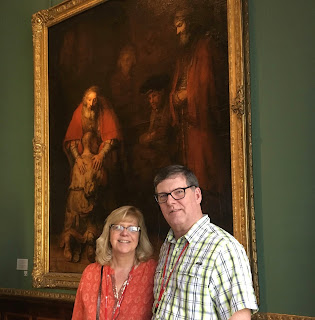This is Not Shame
 |
| Rembrandt’s “Return of the Prodigal Son” at the Hermitage, St. Petersburg, Russia. |
Scripture:
The Lord GOD helps me; therefore I have not been disgraced; therefore I have set my face like flint, and I know that I shall not be put to shame;
(Is. 50:7 NRSV)
Observation:
The words from Isaiah are often thought to be prophetic words about the coming Messiah, but these words are also a promise to all of God’s people. We are called to participate in Christ and therefore we can hold onto the promise that it is the Lord God who helps us in our times of trouble. What may appear to be disgrace in the eyes of others, just may be grace-filled loved in the eyes of God. Therefore, this is not shame, or I am not shamed by my circumstances, but instead, I am transformed in the midst of those circumstance into one who reflects the glory of God.
Application:
We continue the Lenten journey through this Holy Week. This week will lead us to the cross where we find Christ dying for all the world. Jesus understood his circumstances, and that no matter how others treated him, he would not be put to shame for the Father was with him.
In the story of the prodigal son we find the boy returning home, poor, starving and shamed. He is embarrassed to see anyone, and especially his father. He knows that he has shamed the family, and himself, and should have no rights or privilege. However, in his worst moment, his father rushes to him, takes off his cloak and covers the shame with his robe. He would not allow his son to stand before him, shamed, but covered him with all that symbolized the value which he still had in the family. The Heavenly Father covered Jesus with his love and grace. The Father did not turn away from his Son in the moment of his suffering, but when all the guilt and shame of the world was revealed in the ugliness of his death, the Father covered it all. Neither Jesus, nor any of us need to live with the shame.
In the late fourth century John Chrysostom wrote a series of letters to a woman named Olympias. Evidently, she was going through a period of struggles and he encouraged her in this way, “Therefore, let none of these things that are happening trouble [you], but stop asking for the aid of this or that person and running after shadows (for such are human alliances); persistently call on Jesus, whom [you serve] . . . and in a moment of time all these evils will be dissolved. (LETTERS TO OLYMPIAS 7.2) Just like Olympias, we are to persistently call on Jesus, and not on others. No person has the power to take away our shame, only our Savior. The beauty is that in a moment Jesus also reminds us that though the world may want to shame us, we are not put to shame. This is not shame, because our shame has been covered by the love of a gracious Father.
We turn our faces toward the one who loves us and allow him to draw us to the cross, the place where there is no longer any room for shame.
Prayer:
Lord, may we find freedom from the shame which others may try to hang on us. Thank you for the journey which leads us to the cross. Words of gratitude are never enough to thank you for what you have done for us. Amen.
Comments
Post a Comment